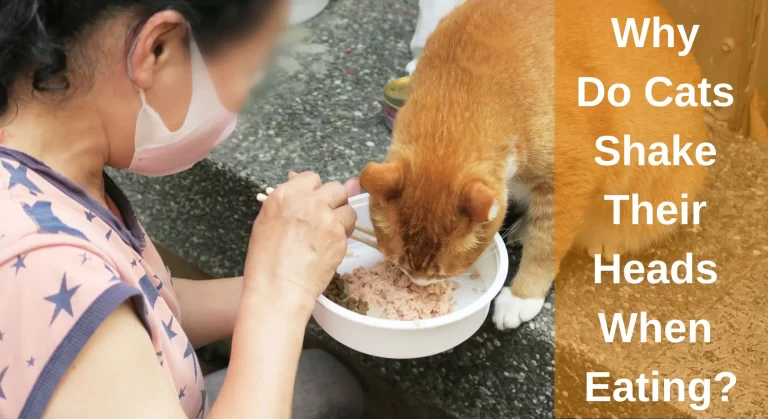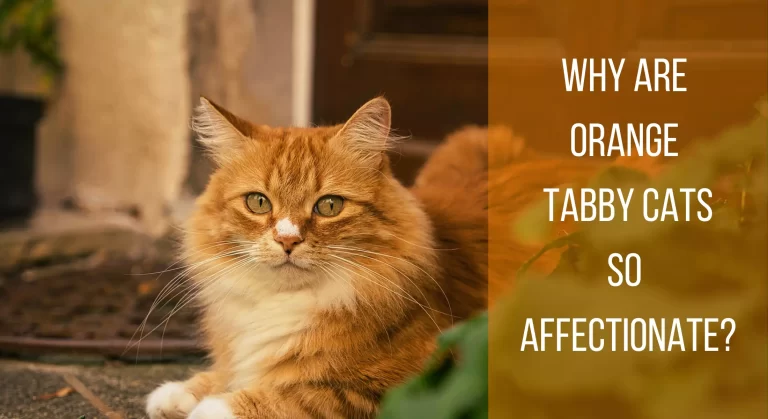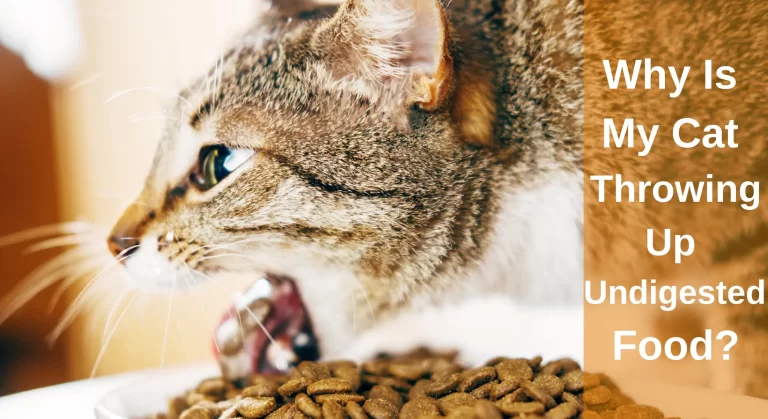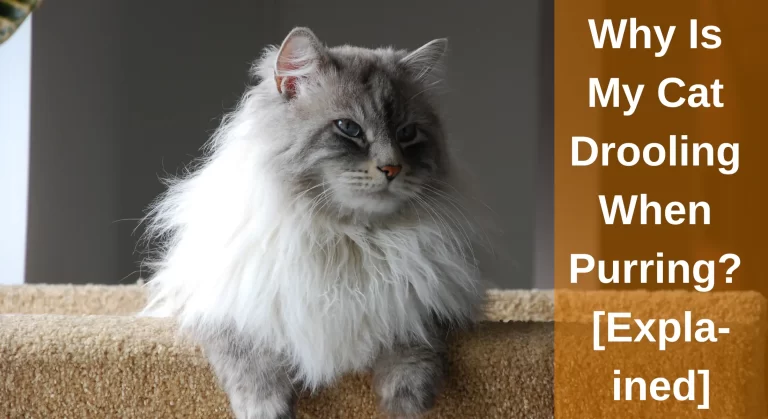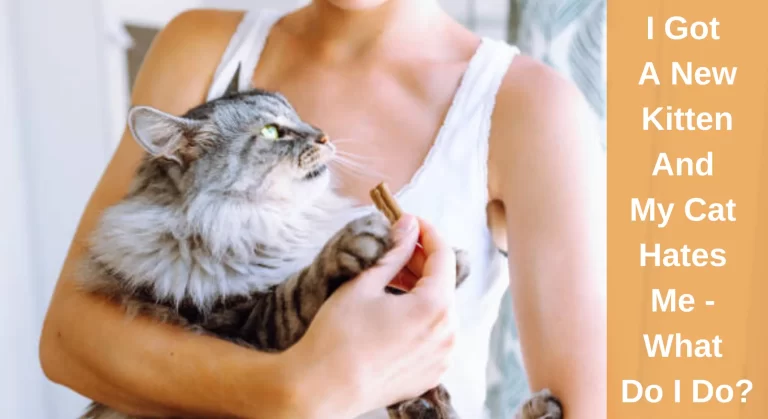Why Does My Cat Meow At The Door? And How To Stop
One of the fascinating vocalization types among our feline companions is the meow of a cat. Kittens will meow at their mothers to communicate, but once your kitten has grown dependent and matured, meows are designated for people alone. It is how they communicate with humans. So, why does my cat meow at the door?
Cats can meow at their owner’s door for various reasons. One of the most common reasons is that they want attention or to be let inside the room. Some cats also meow when they are hungry, bored, or anxious. Moreover, Cats also don’t like to be confined. Understanding your cat’s behavior and determining the reason behind its meowing is essential.
Cats won’t just come meowing at your door for those reasons, so I’ve compiled a list of other reasons why cats meow at the door and what you can do about cats meowing at your door.
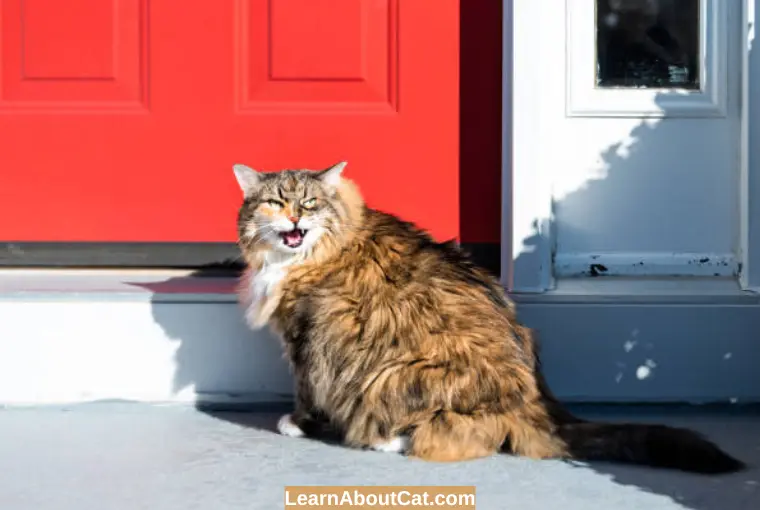
Top Reasons Why Does My Cat Keeps Meowing at Door
Cats are vocal animals that use meowing as a means of communication. When your cat meows at the door, it may be trying to convey a message to you. Here are some possible reasons why cats meow at the door:
1. Hunting Instincts
Cats are natural hunters, and they love to stalk and catch prey. When they hear sounds or movements outside the door, they may become alert and start meowing to express their excitement.
Outdoor cats, particularly those that have more exposure to prey and wildlife, are prone to this behavior.
2. To Make A Request For Entry Or Exit
The cat’s primary mode of communication with you is meowing. She’ll probably learn to meow at the door if she wants to go outdoors.
Be cautious when allowing your cat outside, as they can risk injury or get lost. Consider putting a collar and ID tag on your cat and ensuring they are up-to-date on its vaccinations. You may also want to consider a cat enclosure or other safe outdoor space for them to enjoy.
On the other hand, cats meow at the door because they want to be let inside. This can be especially true if your cat is an indoor/outdoor cat used to coming and going as they please. They may meow at the door to let you know they are ready to return inside and relax.
3. Hunger or Thirst
Cats are creatures of habit and often have a set routine regarding meal times. Meowing at the door can signify that cats are hungry or thirsty and want their owners to feed them.
This behavior can be especially prevalent in cats that are used to being fed at a certain time of day.
4. To Extend A Greeting
Cats are social animals, and they may meow at the door as a way of greeting somebody who is arriving home.
This can be especially true if the person they are greeting is someone they are particularly fond of, such as their owner or a close family member.
When they see the person again, they may meow as an expression of excitement and happiness.
5. Boredom or Loneliness
Like people, cats become bored easily and need a lot of stimulation to keep them happy and engaged. If your cat keeps meowing at the door, it’s conceivable that they’re bored.
They may want you to play with them or give them additional attention, and they will not stop meowing until you do.
6. Attention-Seeking Behavior
Cats are social animals and enjoy being around their owners. Meowing at the door is one way that cats try to get their owners’ attention.
They may want to be petted, played with, or in the same room as their owners. If cats feel ignored or neglected, they may meow more frequently to get their owners’ attention.
7. To Find A Compatible Mate
Cats are also known for their reproductive behavior, and they may meow at the door to call for a mate.
The problem is particularly prevalent in cats that have not been neutered or spayed and are exhibiting mating behaviors. They may meow to attract a potential mate or communicate with other cats in the area.
Cats who aren’t pregnant have a higher proclivity for yowling. Females yowl to indicate their openness to males, and males yowl to get access to females.
8. They’re Curious To Discover More
Cats are inquisitive animals who like exploring their environment. There’s nothing like a locked door with no idea what’s on the other side to stimulate your attention.
They may be intrigued by a new smell or sound coming from outside and may be trying to investigate it further.
Alternatively, your cat is probably meowing at the door they’ve never been allowed to open because they’re inquisitive about what’s on the other side.
Check Out: Will My Cat Come Back If I Let Him Outside?
9. They’re On The Lookout For Someone
Cats can form strong attachments to their owners and other household members, and they may meow at the door if they are missing someone not currently at home.
For example, if you lived with a roommate who moved out, your cat could miss them. Similarly, your cat may call after you or your spouse as you leave the house for work each day.
This can be especially true if the person they are missing is the one who usually feeds them or gives them attention. They may meow at the door to express their sadness or frustration.
Also Read: Why Does My Cat Go Into Another Room And Meow?
10. They Suffer From Cognitive Impairment
As cats age, they may develop cognitive dysfunction, similar to dementia in humans. One of the symptoms of cognitive dysfunction in cats is increased vocalization, including meowing at the door. They may become confused or disoriented and meow as a way of trying to find their way around.
It is important to consult your veterinarian if you suspect your cat suffers from cognitive dysfunction. They may be able to recommend treatments or strategies to help manage your cat’s symptoms and improve its quality of life.
Elderly cats with mental confusion or cognitive impairment may meow, a typical symptom of this feline form of Alzheimer’s Disease.
Why Does My Cat Meow at My Door at Night?
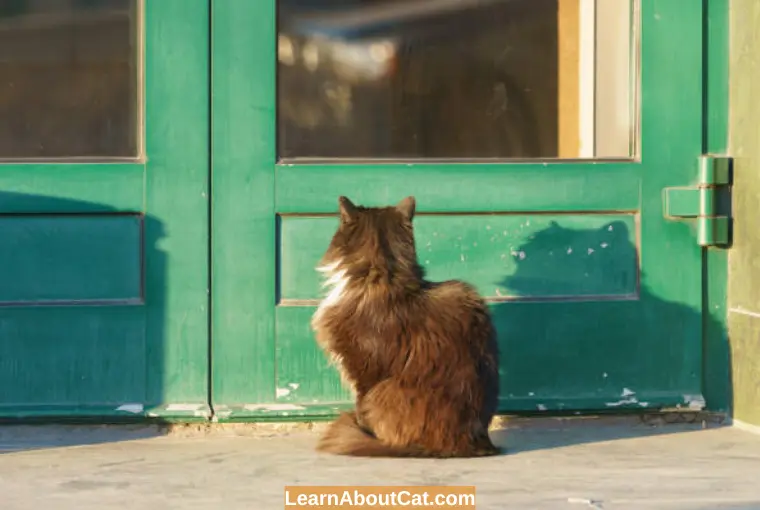
Your cat may be meowing at the bedroom door to capture your attention by wanting to be in the same room as you.
Your cat’s meows may keep you up in the middle of the night if he or she is active, interested, and likes playing. Cats will scratch at your door, paw at you, bump into you, drop down in front of you on the floor, and meow for your attention.
Also, Check Out: Why Does My Cat Meow at Night When I Go to Bed?
Why Does My Cat Meow When I Close the Door?
If your cat is shut out of the room and meows at you from outside, they probably want to be with you. Cats, despite their independence, sometimes grow lonely and like to be near their owners.
This might explain why your cat waits outside your bedroom door while you sleep. Allow your cat in for some kitty hugs if you hear them meowing.
How Do I Stop My Cat From Meowing at the Door?
First, consult your veterinarian to rule out any potential health issues. You must also ensure that the closed door does not separate them from their necessities – food, water, and a litter box. If your cat is still meowing at the door after you’ve done everything else, here are a few extra things you may try.
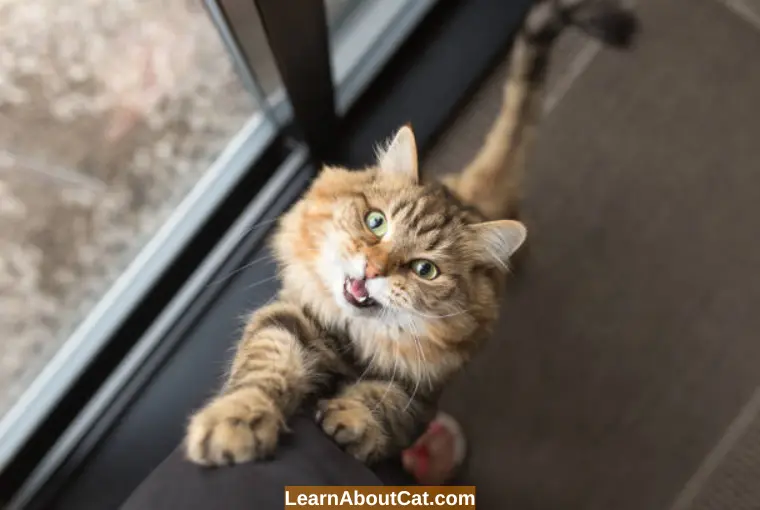
1. Make Plenty Of Entertainment
Keeping a cat entertained is essential when attempting to stop them from meowing, especially if you have an indoor-only cat or your cat spends much time alone at home. They must explore and interact with their environment to stay happy and healthy.
Investing in high-quality cat toys is an excellent way to improve your cat’s life. It would be best if you chose a variety of toys with varying textures and colors.
2. Provide A Relaxing Environment
The cat is a creature of habit and thrives in a comfortable environment. If you’re locking your cat out of your room for the night, make sure your cat has a comfortable place to sleep and relax. Cats can grow lonely and bored at night, especially because twilight and morning are when cats are most active and alert.
Ensure that their litter box is clean and placed in a quiet area. Consider using a pheromone diffuser for your cat’s comfort and to reduce stress.
3. Keep Your Cat’s Food and Water Bowls Full
As we mentioned earlier, hunger or thirst could be why your cat is meowing at the door. Maintain a full and easy-accessible food and water bowl for your cat. Consider feeding them on a regular schedule to help them establish a routine.
4. Provide a Safe Outdoor Space
If your cat wants to go outside, consider providing them with a safe and secure outdoor space, such as a cat enclosure or enclosed garden.
This can allow them to explore and enjoy the outdoors without the risks associated with free-roaming cats.
5. Pay Attention To Your Cat Before Bedtime
Meowing at the door may be due to boredom or inattention. To stop your cat from meowing at the door, ensure you provide enough playtime and attention during the day. Cats need to exercise and play to release their energy, and this can keep them calm and content.
Some cats weep like babies at night, and if your cat meows incessantly at your bedroom door, giving them a huge fuss before bed will help. Begin by playing with all of your cat’s favorite toys. They will appreciate your time.
6. Deterrents Should Be Placed Outside The Door
Because your cat will dislike the sticky feeling on their paws, double-sided sticky tape or a piece of tin foil might stop cats from approaching your room.
Deterrents can also be placed outside doors you don’t want your cat to claw or meow at, such as your bedroom door.
7. Creating a Distraction
You can prevent your cat from meowing at the door by creating a distraction. For instance, you can give your cat a toy or treat to keep them busy.
You can also play some relaxing music or turn on the TV to distract your cat from meowing at the door.
8. Using Positive Reinforcement
A good way to reduce your cat’s meowing is to train it to avoid the door. You can use positive reinforcement to train your cat to stay in a designated area of the house or to use a specific door to go in and out.
Positive reinforcement can be an effective method for preventing your cat from meowing at the door. Whenever your cat stops meowing, reward them with a treat or a toy.
Over time, your cat will associate not meowing with getting a reward, which can help them stop meowing at the door.
9. Ignore Cats’ Meowing
If you’re confident you’re giving your cat everything they need, and they’re still meowing nonstop, it’s time to ignore them.
This is especially true for meowing at night, which can interrupt your sleep and mood. They will likely end after weeks of ignoring your cat’s nighttime calls.
10. Don’t Berate Your Cat
Many owners may attempt to instruct their cats not to meow by penalizing them for doing so. You may clap your hands to scare them and make them stop, or you might yell at them to stop.
By frightening people away, you are not addressing the issue, and the fundamental problem remains. Furthermore, your cat may begin to dread you, and your tight link may be destroyed.
11. Set Up A Cat Flap
If your cat is continuously meowing to go inside and outdoors, you should consider installing a cat flap, so you don’t have to be there to open and close the door at your cat’s beck and call. This guarantees that your cat always has food, drink, and shelter.
Because the outdoors may give a lot of good stimuli, your cat may meow less at night. Provide lots of stimulus within the home to help them adjust more readily.
Frequently Asked Questions
Should I give sedatives to my cat to make her stop meowing?
No, giving your cat sedatives to halt her meowing will not solve the problem; it will only put it off for a while. So, if you wish to stop her meowing, you need the first figure out what’s causing it.
What should you do if your cat constantly meows?
Get her checked by a veterinarian for physical problems, sensory deficiencies, and cognitive dysfunction. Medication might help her feel better.
Do cat hates closed doors?
Cats dislike closed doors and meow excessively if they are closed for various reasons, such as feeling trapped, overwhelmed, or having Separation anxiety.
Cats are inquisitive creatures who want to know what lies beyond them. It’s not their intention to annoy you.
Why does my cat cry when I close my door?
If your cat cries when you close the door, it could signify separation anxiety. Cats are social animals, and they enjoy spending time with their owners. Closing the door may isolate them, leading to anxiety and stress.
Do cats get mad when you close the door?
While cats may not get mad when you close the door, they may feel anxious or stressed if they are not used to being separated from their owner. It is essential to provide your cat with enough social interaction and playtime during the day and to create a comfortable and secure sleeping area for them at night.
Final Words!
Because your cat attempts to connect with you, he or she keeps meowing at the door. However, it’s possible that they’re attempting to communicate. They may be bored or interested and want to go outside, or they may want to come inside the room you’re in for some attention. They might also be expressing their want for breakfast, greeting you, or suffering from cognitive impairment.
After you’ve ruled out medical difficulties, you may entice your cat to quit meowing by providing them with as much entertainment as possible. Provide love and attention, play with them regularly, and experiment with different feeding patterns, so you don’t have to get up too early. Above all, don’t chastise your cat when it meows.
Related Posts
Who is Isabella?
My name is Isabella, and I am a dedicated and knowledgeable cat enthusiast. With years of experience caring for cats and a deep love for felines, I made a mission to help other cat lovers navigate the challenges of cat ownership.

